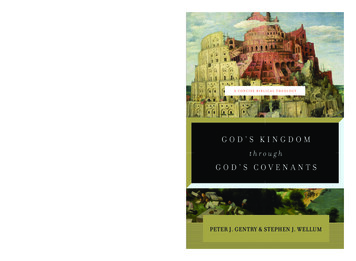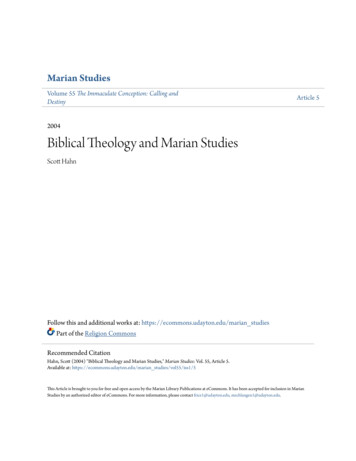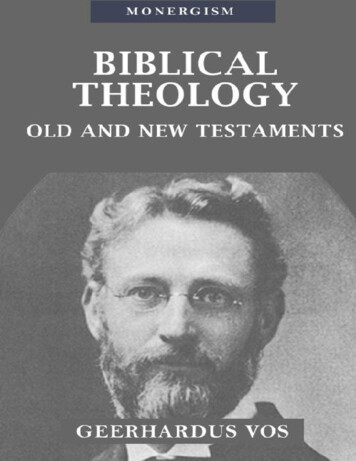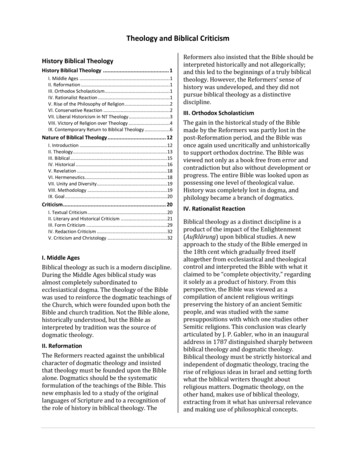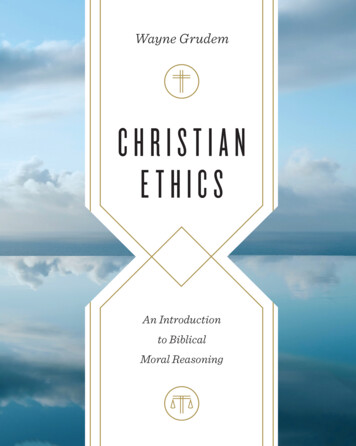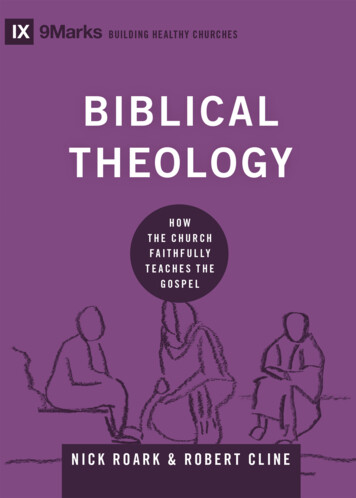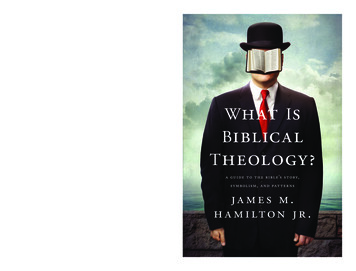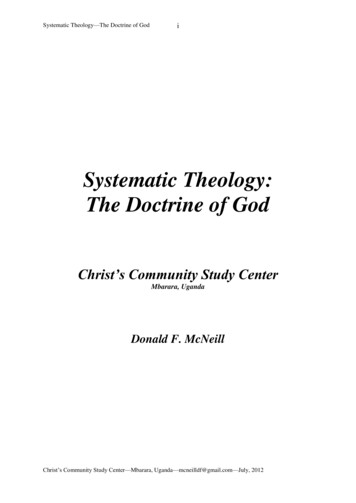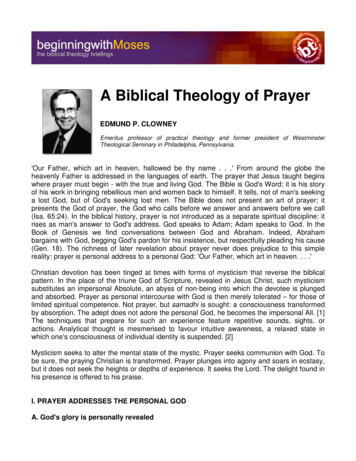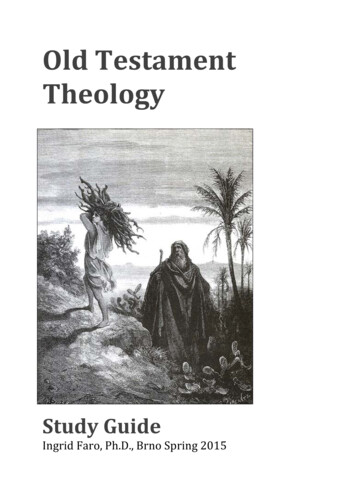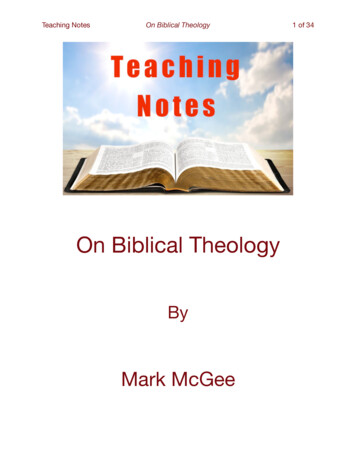
Transcription
Teaching NotesOn Biblical TheologyOn Biblical TheologyByMark McGee1 of 34
Teaching NotesOn Biblical Theology2 of 34
Teaching NotesOn Biblical Theology3 of 34Teaching Notes are Bible studies we taught beforeGraceLife Ministries began publishing articles online in1995. Some were presented as sermons, others as groupstudies.Our hope is that these older studies will be a blessing toyou in your life and ministry. Please use them in any wayGod leads you.These teaching notes are from a series of studies aboutBiblical Theology.[These notes are from a study presented 45 years ago.]Our subject for this study is Biblical Theology. We will beusing the Bible, of course, along with scholarly works onthe topic. We will look at two works in particular, followedby a list of other books you may be interested in reading.
Teaching NotesOn Biblical Theology4 of 34
Teaching NotesOn Biblical Theology5 of 34From Eternity to EternityOur first book is Erich Sauer’s From Eternity to Eternity: AnOutline of Divine Purposes. It was first published in German in1950 under the title Der göttliche Erlösungsplan von Ewigkeit zuEwigkeit. The English translation by G. H. Lang was published in1954 by Eerdman’s Publishing Company, Grand Rapids,Michigan.Sauer was born in Germany at the end of the 19th century anddied in 1959 at the age of 60. He taught at a Bible School inWiedenest for the last 20 years of his life and wrote severalbooks including Dawn of World Redemption: A Survey of theHistory of Salvation in the Old Testament, In the Arena of Faith: ACall to the Consecrated Life, The Triumph of the Crucified: ASurvey of Historical Revelation in the New Testament, and TheKing of the Earth, the High Calling of Man According to the Bibleand Science.
Teaching NotesOn Biblical Theology6 of 34The main purpose of Sauer’s book is to present the ways of Godwith men. The book is written in three parts –1. The first deals with God’s eternal plan of salvation2. The second deals with the Bible as the record of God’seternal plan of salvation in the lives of men3. The third deals with the coming Kingdom of God and theculmination of the eternal plans of GodIn the first part of the book, Sauer deals with Heaven and earth inGod’s plan. He also presents thoughts on God’s revelation ofsalvation to mankind, the mystery of Israel, and the history of theTemple of God. Sauer deals with God’s plans through Christ atgreat length. He also writes about the Church and the Kingdom.In the second part of the book, Sauer presents the case for verbalinspiration and infallibility of the Bible. Sauer uses logic, nature,harmony of the whole Scripture, uniformity of structure, and thewords of Christ and the apostles to present his case.The third part deals with various problems in understanding theprophesies of the coming Kingdom of God.
Teaching NotesOn Biblical Theology7 of 34Here’s an outline of the first chapter of the book to get an idea ofhow Sauer addresses the issue of Biblical Theology.Heaven and Earth in God’s PlanI. The Eternal GodA. Before anything existed, God wasB. God is Three Persons and One GodC. God created all things and therefore all things belong to HimII. Christ’s Salvation CenterA. God executes His plans through His SonB. Christ is the center of all history1. This was God’s purpose from eternity2. The cross of Christ is from all eternity
Teaching NotesOn Biblical Theology8 of 34C. God has faithfully fulfilled all promises given to manIII. The Starry World as the Background of the History of SalvationA. God is far above man in power and knowledgeB. The Bible is above and free from human speculationC. The cosmos and the heavenly host all play part in the history ofman’s salvationD. The symbols of all creation – lion, ox, eagle, and man –declare that God is Lord of the universeIV. The Earth in the Universal Plan of GodA. The earth is the great stage upon which the acts of man’ssalvation are played
Teaching NotesOn Biblical Theology9 of 34B. The earth has seen five stages of relationship so far *1. Creation of original earth2. Entrance of sin3. Further development4. Paradise5. Fall and current conditionC. The earth will be the great battleground in the war betweenGod and the devilD. God will complete His work for a perfection creationE. The throne of God will rest on the earth forever[* “How far at the time that sin entered the universe the work ofcreation had progressed in detail the Biblical account does notparticularize at full length. We do not know whether that earlycreation had reached the stage of a completed development,either as ‘first earth,’ or ‘light earth,’ or ‘primeval creation.’Therefore, since full information as to conditions on thatprehistoric and pre-human earth is not available, we speak
Teaching NotesOn Biblical Theology10 of 34but quite generally upon that stage of earth’s history.” Eric SauerCh. 1]
Teaching NotesOn Biblical Theology11 of 34Progress of DoctrineOur second book is Thomas Bernard’s The Progress of Doctrinein the New Testament. The book was based on the BamptonLecture series Bernard preached at the University of Oxford. Itwas published in 1864 by Macmillan and Co. in London.Bernard was born in 1815 and died in 1904. He was a pastor inthe Anglican Church and was well-known for his grasp of BiblicalTheology. Bernard also wrote Before His Presence with a Song,The Central Teaching of Jesus Christ, Songs of the Holy Nativityand The Word and Sacraments.The main purpose of Bernard’s The Progress of Doctrine in theNew Testament is to show that the “New Testament itself exhibitsa scheme of progressive doctrine, fashioned for permanent anduniversal use.”The book is the printing of eight lectures given by Bernard atOxford University in 1864. The series of lectures shows asequence of thought in the Gospels, Acts, the Epistles andApocalypse. It also deals with the order in which they are placed.
Teaching NotesOn Biblical Theology12 of 34Bernard points up the verbal inspiration and infallibility of theBible. He deals with words spoken by Christ and the apostles. Heshows the actions of Christ in revealing Himself throughout all ofthe New Testament.
Teaching NotesOn Biblical Theology13 of 34Comparing TextsThe subjects dealt with in Sauer’s book are basically the eternalityof God, the Trinity of God, the Son of God, the Creation of God,and the completion of the Plan of God.Bernard’s book is a careful presentation of the unfolding of GodsPlan. Chapters 2 and 3 show Christ to be the center of God’s planof salvation. They also show Christ to be the great Revealerof God’s plan. Chapters 4 and 5 deal with man’s part in presenting Christas the center of God’s eternal plan. They are constantlyguided by Christ through the Spirit. Now that God’sredemption is completed, the message is to be heardthroughout the world. Chapters 6 and 7 are the works of Christ with His Church.The Lord is the center of their lives, as is consistent withGod’s eternal plans. Chapter 8 deals with the pre-eminence of Christ, the greatbattle of God and Satan, and the restoration of the earth.
Teaching NotesOn Biblical Theology14 of 34Other Materials of InterestChrist – The Head of the Church, Arno Weniger, FundamentalBaptist Congress of North America, 1968A Handbook of Christian Truth, Harold Lindsell and CharlesWoodbridge, Fleming R. Revell Co., 1953The Sovereignty of God, Arthur Pink, Baker Book House, 1930Lectures on the Revelation, H.A. Ironside, Loizeaux Brothers,1919The Late Great Planet Earth, Hal Lindsey, Zondervan, 1970The Coming Kingdom of Christ, John R. Rice, Sword of the Lord,1945Profiles of Prophecy, S. Franklin Logsden, Zondervan, 1970The Witness of the Stars, E.W. Bullinger, Kregel Publications,1967
Teaching NotesOn Biblical Theology15 of 34Lectures in Systematic Theology, Henry Thiessen, EerdmansPublishing, 1949God’s Plan And You, Paul Van Gorder, Radio Bible Class, 1974The God-Man, Richard DeHaan, Radio Bible Class, 1970The Triune God, Richard DeHaan, Radio Bible Class, 1967The Conflict of the Ages, M.R. DeHaan, Radio Bible ClassA King Is Born, M.R. DeHaan, Radio Bible Class
Teaching NotesOn Biblical TheologyThe Eternal GodI.God is eternal. Isaiah 57:15A. He always wasB. He isC. He always will beII. God is Three and One. Matthew 28:19-20; 1 Peter 1:2A. God is Father, Son, and Holy SpiritB. The Father, Son, and Holy Spirit are God16 of 34
Teaching NotesOn Biblical TheologyPublic Domain17 of 34
Teaching NotesOn Biblical Theology18 of 34III. God is the Creator of all.A. He created everything – Nehemiah 9:6B. Everything was created for Him – Romans 11:36; Colossians1:16
Teaching NotesOn Biblical Theology19 of 34Christ’s KingdomWe are using the text of two books to guide us in our study alongwith Scripture. They are –1. Erich Sauer’s From Eternity to Eternity2. Thomas Bernard’s The Purpose of Doctrine in the NewTestamentWe’ll now compare their viewpoints on Christ’s Kingdom.I. Two Viewpoints on Christ’s KingdomA. The rule of Messiah will begin only at the setting up of HisKingdom in glory at His return in the End time.B. The Davidic Kingship of Messiah began at the ascension andexaltation of the Divine Son of David to the right hand of thethrone of the Majesty in the heavens.
Teaching NotesOn Biblical Theology20 of 34II. Points of difference in the two viewpointsA. The degree of this extension as regards what persons andlands are included . to what extent Israel, to what extent the othernations.B. The form of this rule, whether it will be only inward and spiritualor, in addition, visible and external, indeed, even historical andpolitical.C. The dating of this Davidic Kingship of the Son of David whetherits commencement is to be placed at the ascension andPentecost or only at the future parousias and epiphany.III. Explanation of the “throne of David”A. It is not literal as regards the rule of the Messiah.B. It does not mean just the earthly national political “State” overwhich David ruled.
Teaching NotesOn Biblical Theology21 of 34IV. Christ’s Kingdom will be of wider scope than David’sA. Christ is Lord of the Church, which is made up of millions fromevery nation.B. The Millennial Reign will place Christ as ruler over all nations.C. Christ will rule men on earth and saints raised from the deadand glorified.V. How Christ will set up His KingdomA. The judgment upon and destruction of the sinful kingdom ofIsrael.B. The visiting by God of the Gentiles to take out of them a peoplefor His Name.C. The return of the Lord.D. The rebuilding and raising up of the tabernacle of David.
Teaching NotesOn Biblical Theology22 of 34E. The conversion to God of the residue of men, in connectionwith this restoration of Israel.VI. Prophecy backs up the view of an earthly reignA. Acts 15:13-17B. Amos 9:8-10C. Romans 15:7-9, 12D. Isaiah 55:3VII. The two viewpoints not irreconcilableA. The current dispensation brings in a certain sense of fulfillmentof many prophecies of the old covenant.B. The prophesies have often a double and threefold fulfillment.C. Christ is ruling over the lives of believers today and there willcome a day when He will establish an earthly reign over all men.
Teaching NotesOn Biblical Theology23 of 34VIII. The Decisive ground for expecting a Millennial KingdomA. The definite statements of the prophets concerning a futurenational reuniting of the two-tribes and ten-tribes kingdoms in thetime of Messiah (Ezekiel 37:15-24; Hosea 1:11; Jeremiah 3:8;Zechariah 10:6)B. The definite testimony of the prophets that in the time ofMessiah, Israel will again dwell in the land of their fathers(Jeremiah 16:15), in their own land (Ezekiel 28:25), in this land(Jeremiah 32:41), into the land of Gilead and Lebanon (Zechariah10:10).C. The equally clear announcement that this will be effected onlyby its being associated with the glorious appearing of Messiah(Zechariah 14:4; Daniel 7:13-14; Matthew 24:30; 26:24;Revelation 1:5) and with the inward renewing of Israel (Hosea 3:5;Isaiah 4:4; 11:9; Ezekiel 36:26; Zechariah 13:1).D. The announcement that there would be a conversion andrenewal of the other nations (Isaiah 2:3-4; 19:23-25; Zephaniah3:9; Zechariah 14:9; Malachi 1:11).
Teaching NotesOn Biblical Theology24 of 34E. The God-given inspired interpretation of the dream visions ofthe Book of Daniel.F. The unmistakable answer of Jesus to His disciples (Acts 1:6-8).G. The testimony of the Revelation (Revelation 19:11-21; 20:4-6,9-11).
Teaching NotesOn Biblical Theology25 of 34The ApocalypseIn Bernard’s lecture on the Revelation of Christ, written by theApostle John, Bernard shows a connection between the progressof prophecy and the progress of doctrine.Bernard breaks the lecture into two main points with the secondhaving six parts. The second point deals somewhat with the futureKingdom of Christ. He points out the doctrinal position of the bookas being a doctrine of consummation. His six parts under thispoint are –1. A doctrine of the Cause of the consummation2. A doctrine of the History of the consummation3. A doctrine of the Coming of the Lord4. A doctrine of Victory5. A doctrine of Judgment6. A doctrine of Restoration
Teaching NotesOn Biblical Theology26 of 34This sixth part deals somewhat with the last chapter of the firsttext by Sauer. Bernard points out that there will be a perfecthumanity and perfect society. The New Jerusalem will be afulfillment of the ancient promises of God.Practical ApplicationI. The Kingdom of David to be RestoredA. II Samuel 7:8-16B. Psalm 89:27-37C. Isaiah 11:1-2D. Jeremiah 23:3-6E. Jeremiah 33:14-17
Teaching NotesOn Biblical TheologyII. Jesus will rule on David’s throneLuke 1:30-3327 of 34
Teaching NotesOn Biblical Theology28 of 34Other Available Study MaterialsComing Events in Prophecy, M.R. DeHaan, Zondervan, 1962(Chapters 22 & 23)Daniel, Oliver Greene, The Gospel Hour, 1964 (Chapters 2, 7-9,11-12)Daniel The Prophet, M.R. DeHaan, Zondervan, 1947 (Chapters 2,4, 7-9, 1-12)Revelation, Lehman Strauss, Loizeaux Brothers, 1964 (pp329-344)The Revelation, Oliver Greene, The Gospel Hour, 1963 (Chapters19 – 22)The True Messiah, Richard DeHaan, Radio Bible Class, 1974This Same Jesus Is Coming Again, M.R. DeHaan, Radio BibleClass, 1962
Teaching NotesOn Biblical Theology29 of 34God’s Program for Israel, Theodore Epp, Back To the Bible, 1968Earth’s Coming Golden Age, A.E. Logan, Georgia Bible Institute,19731,000, Salem Kirban, 1973The Late Great Planet Earth, Hal Lindsey, Zondervan, 1970Profiles of Prophecy, Franklin Logsdon, Zondervan, 1970(Chapters 16 – 21)The Coming Kingdom of Christ, John Rice, Sword of the Lord,1945 (Chapter 8)Systematic Theology, Henry C. Thiessen, Eerdmans Publishing,1949 (Chapters 41 – 42, 45 – 47)The Olivet Discourse, Carl Armerding, Dunham Publishing, 1955
Teaching NotesOn Biblical Theology30 of 34
Teaching NotesOn Biblical Theology31 of 34Present Complete Salvation in ChristJesus Christ is the Savior of the world. Without Him there wouldbe no hope, no life, no peace, no comfort. He is the greatProphet, Priest and King. He is the great Mediator between Godand men.This great salvation is a free gift of God. We are made heirs withHim. We’ve become part of the King’s family and will reign withHim forever.To fully experience victory and joy in our salvation, we mustrealize seven things:1. We must accept and believe the fact that Christ hascompletely conquered our sin and given us eternal life2. We must fully surrender to Christ3. We must study the Word of God consistently4. We must be faithful in little things5. We must be regular in prayer6. We must witness with courage and vigor7. We must practice the presence of Christ in our lives
Teaching NotesOn Biblical Theology32 of 34Personal ApplicationThe seven points are excellent points for daily living. These arethings that I can remember each day throughout my ministry andfamily life.Every morning when I awake I should remember that my faith iscomplete in Christ and I have nothing to worry about. I shouldbegin each day by surrendering my life to God anew. nevershould a day pass that I do not spend time in the precious Wordof God. I need to always remember that my main work on earth isto be faithful, whether the things be big or small. A prayer life isabsolutely essential to a powerful life. We have been called towitness that which we have both seen and heard. I need towitness every day as I have opportunity. I must practice thepresent of Christ every day.
Teaching NotesOn Biblical Theology33 of 34Other Available Study MaterialsChrist Prophet, Priest & King, Paul Van Gorder, Radio BibleClass, 1972The Biblical Faith of Baptists, Volume III, Various Authors,Fundamental Baptist Congress of North America, 1968 (Chapter14)On These We Stand, William Bellshaw, Accent Books, 1968(Chapters 3, 8 & 9)A Handbook of Christian Truths, Harold Lindsell, Fleming RevellCo., 1953 (Chapters 17-40)Old Paths, Dr. John Charles Ryle, James Clarke & Co., 1972(Chapters 9 & 17)Absolute Surrender, Andrew Murray, Moody Press, 1895,(Chapter 1)
Teaching NotesOn Biblical Theology34 of 34Systematic Theology, Dr. Henry Thiessen, Eerdmans Publishing,1949, (Chapters 25-26Copyright GraceLife, 1990-2021
Biblical Theology. [These notes are from a study presented 45 years ago.] Our subject for this study is Biblical Theology. We will be using the Bible, of course, along with scholarly works on the topic. We will look at two works in particular, followed b
